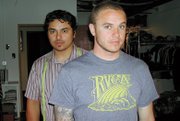Is it Surf or Contemporary? RVCA Dives Into a New Look
RVCA won the Surf Industry Manufacturers Association’s coveted Breakthrough Manufacturer of the Year award in May 2004, but founder and designer Pat Tenore says his collection is anything but surfwear.
“I never opted to work in the surf-and-skate industry,” Tenore said inside his 14,000-square-foot headquarters in Costa Mesa, Calif., a few miles away from the main offices of surf powerhouses Quiksilver Inc. and Billabong. “It just so happens we sponsor a surf team and a skate team. We’re an apparel company first and foremost.”
It’s a strange statement coming from a man who runs his clothing company with former pro-surfer Conan Hayes. But their declaration of independence from surfwear may be what is making RVCA, pronounced “RUCA,” popular, said Marie Case, managing director of Trabuco Canyon, Calif.–based Board-Trac, a marketing research company specializing in the surf-, skate- and snowboarding worlds.
“What used to be the core brands broadened their distribution outside of the surf world,” Case said. “So there’s no style to differentiate the surf kids and the skateboarders who are iconoclasts.”
Enter RVCA. The collection has been popular among the early adopters in the surf and skate crowds. But the company prides itself on selling in 500 stores domestically, including the Active Ride Shop chain of specialty shops, headquartered in Ontario, Calif.; S2 at Fred Segal Santa Monica; The Closet chain of specialty boutiques, headquartered in Costa Mesa, Calif.; and Villains Clothing and Shoes in San Francisco.
RVCA’s collection features T-shirts, fleece jackets and baseball caps emblazoned with designs from visual artists, ranging from Mark Mothersbaugh, founder of iconic 1980s music group Devo, to underground graffiti artists such as Eklips.
The focus on art and specialty shops may be the next frontier for surfwear as the industry aspires to fashion, said Aaron Levant, partner of the Agenda showroom in the California Market Center and co-organizer of the Agenda trade show, launched as a satellite show to the Action Sports Retailer Trade Expo, now held biannually in San Diego. “Where many companies are just thinking about their public relations, Pat is thinking about art, and that’s going to open it up to another market,” Levant said.
The market RVCA is intent on cracking is better contemporary. RVCA’s ambitious 360-piece Fall 2004 collection features premium denim, woven shirts, fedora hats and wool sweaters, along with the company’s popular T-shirts, walking shorts and boardshorts. Also offered is a women’s line composed of denim, T-shirts and fleece.
Retail price points run $150 to $200 for denim, $28 for T-shirts, $68 to $75 for fleece, and $32 to $40 for baseball caps. Tenore said 75 percent of the company’s revenue comes from cut-and-sew, 20 percent comes from T-shirts, and 5 percent comes from hats.
RVCA’s most compelling offering to the apparel industry may be its soft ring-spun cotton T-shirts, said Jeff Jones, a sales representative for custom orders at Los Angeles– based American Apparel Inc., which produces T-shirts for the imprintable industry as well as its own line.
“Everyone in the industry wants to knock off RVCA’s vintage poly-cotton shirts because they’re soft and because they have such a nice hem to them,” Jones said. “Everyone asks me if we make them.”
The tees feature contrast stitching around the necks and are treated with a vintage or over-dye wash.
Tenore designed the T-shirts to fit between a regular slim cut and a mid-slim cut so they are not too tight or too baggy.
The popularity of the T-shirts helped RVCA grow from three employees in 2001 to 22 full-time employees this year. The shirts have also helped place RVCA’s apparel in more than 500 U.S. stores and more than 250 stores overseas.
The seeds for RVCA were planted when Tenore started working for designer Austyn Zung during her sojourn in Laguna Beach, Calif., in the 1980s.
Zung met Tenore while he was working sales for the now-defunct surf shop Corona Del Mar Beach Club. Tenore, then age 15, was eager to act as Zung’s scout for youth trends. He also got his first lessons in sewing and designing at her studio.
Tenore got a crash course in retail in 1991, when he spent $20,000 earmarked for his college tuition. His retail mix included Triple 5 Soul and X-Large, as well as sweaters and leather jackets he purchased from vintage stores. He made these vintage clothes new by cleaning them up and putting his own details on them.
He merged that shop into another retail operation, Stateside, and then left that company to launch his own label, PM Tenore, which failed.
In 2001, he told Hayes, a friend from his surfing days, about his idea for RVCA. Hayes invested $60,000 from his surfing winnings and later became a company product manager after he retired from the sport.
The company is still privately held by Tenore and Hayes, and they plan to control its growth by concentrating on the department stores and specialty shops that were among their first accounts.
“We were first accepted in American Rag, Fred Segal [Melrose and Santa Monica] and Villains,” Tenore said. “We couldn’t get into the surf and skate shops. We thought all of these shops would call us, but we were in for a rude awakening. We were supposed to be in those stores!”






















